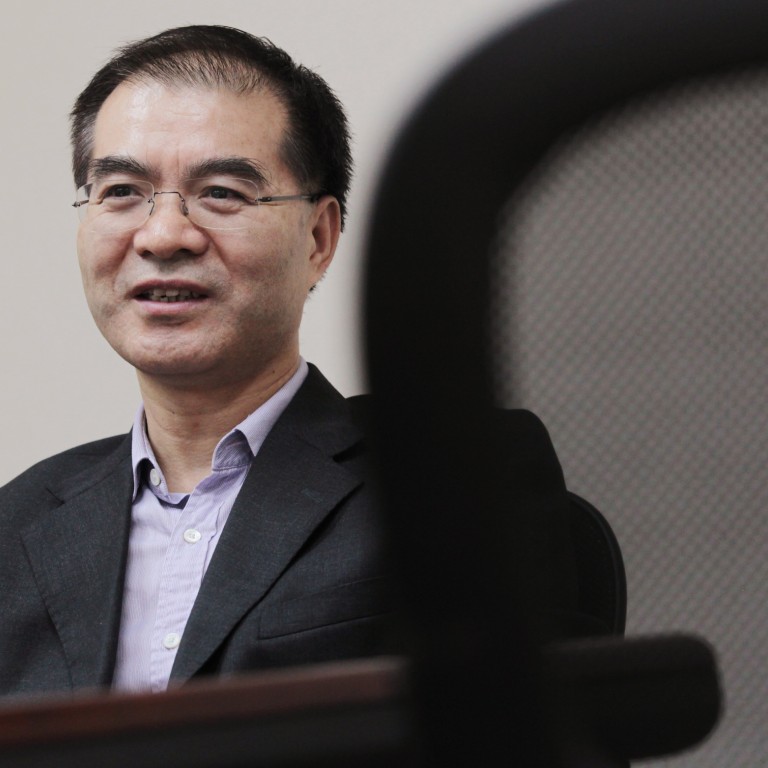
Finance chief tells of Country Garden’s love for small cities
Wu Jianbin goes for cheap and mega projects in small cities on the mainland while tapping Country Garden's full industry chain to manage cost and speed up delivery when needed
Low funding cost is virtually in the genetic make-up of Wu Jianbin, who joined Country Garden Holdings in April from China Overseas Holdings. He was also an executive director and financial controller of China Overseas Land and Investment from 2002 to 2009.
China Overseas Land, the biggest Hong Kong-listed mainland developer by market capitalisation, enjoys the lowest financing cost in the industry, which averaged 4 per cent in the first half.
Wu achieved that through several rights issues, which in turn funded the cheap expansion of China Overseas over many years.
He is now handling a HK$3.2 billion rights issue for Country Garden, which will be completed in mid-October.
The capital markets veteran is bringing in a raft of changes, but he is not ending Country Garden's love affair with the mainland's small cities.
Companies can optimise administrative cost, sales cost and funding cost to improve net profit margin.
Any individual developer cannot prevent a fall in gross profit margin because the costs of construction and land are hard to lower. Developers cannot improve gross profit margin unless the product structure and location in the reporting period is better than before.
Yes, we bought a plot in Fangshan in Beijing, near Hebei province. We will increase our proportion of projects in the suburban areas of first and second-tier cities, such as Lanzhou. But downtown areas of first and second-tier cities are not Country Garden's first choice.
The company aims to build homes that ordinary families can afford. That means cheap and mega projects. Our average selling price in the first half was only 6,900 yuan (HK$8,690) per square metre. Put such prices in top cities and we will suffer huge losses.
It's pretty good. We have sold about 70 per cent of our new projects. And some were sold out in a few days.
The mainland has more than 2,500 third and fourth-tier cities. Country Garden is only present in 95 cities, including the suburbs of top-tier cities. The mainland's property market is huge.
Then I'll stop and move to a neighbouring city. These small cities, or counties, are near one another. We will deploy the same team, with no increase in management cost. For example, there are many counties surrounding Beijing. One is next to another. We have entered 15 counties in Guangdong province and are very successful.
When entering a new market, you have to pay some tuition fees. It takes several years to adapt to local culture, the market environment and local people's preferences. It's already a success not to suffer losses at the beginning. After two or three years, the team will mature and we will be able to reduce cost.
Every developer needs to differentiate as understanding of the market is different. Some think the industry has no future, some think small cities are dead, but others think small cities have huge potential. Developers need to form their own core competitiveness.
Country Garden has some core competitive edges that other developers will not be able to catch up with easily in a long period of time. A developer tried to copy Country Garden's model and develop in small cities, but ended up in a mess. The reason is simple: it does not have some key advantages that Country Garden has.
We have an unrivalled full industry chain, from design and construction subsidiaries to furnishing, flooring and stone suppliers as well as a gardening firm. Many other developers have to outsource them all after buying a piece of land.
That means Country Garden can better manage cost and speed up delivery when needed. We can start construction three months after land acquisitions and begin pre-sales in five months. The project will start to generate income in the sixth month and we will have net cash flow within seven or eight months.
I hope to hit it. But I won't be bothered too much if we miss it. The market has changed and I slowed construction of 7 million to 8 million sqmetres of property projects in the first half.
I have a few core principles. First, protect sufficient cash flow. Second, change production pace in line with sales. Third, produce based on cash collection.
Country Garden enjoys low land cost, of slightly above 10 per cent of the selling price. It costs less to set idle a piece of raw land than to suspend a project under construction.
We will have no problem to hit more than 100 billion yuan in sales. I think Country Garden will stay at the top five, or top 10, developers. We will not care too much about rankings in size as we are already a company of more than 100 billion yuan in sales. It's meaningless. Eventually, investors will look at earnings and dividends.
We will expand to central regions, such as Shanxi and Shaanxi provinces.

